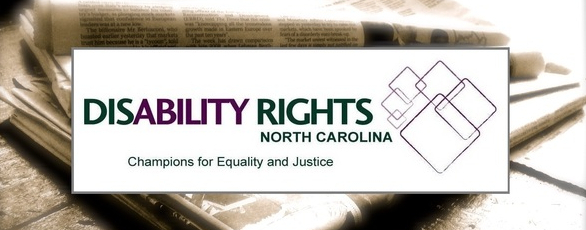www.disabilityrightsnc.org
On Target eNews comes to you the first Tuesday of each month with updates on our clients, our organization, and our work. We also publish a full newsletter three times a year.
Target survey now open
Each year, Disability Rights NC seeks public input on what areas of
disability advocacy it should focus. With limited resources, it's impossible to
address every violation of rights experienced by a person with a disability. But
we try to make as big an impact as possible and improve systemic problems.
The Proposed
2017 Targets were approved by the board of directors on June 17, 2016. An
online survey is now
open to receive input on our proposed targets. In addition, the survey offers an
opportunity for the public to tell us about other issues that are important to
people with disabilities in North Carolina. The survey will be open until
6:00 pm on August 4, 2016. Contact our office at 877-235-4210 if you need a copy
of the survey mailed to you or you need assistance completing the survey.
Disability Rights NC settles lawsuit with Duke for failing to accommodate student with learning disabilities
Disability Rights North Carolina recently resolved a lawsuit against Duke University for discriminating against a student with dyslexia in its Master of Divinity program. Under the settlement, Duke agreed to provide additional training to its disability services staff and liaisons to enhance the effectiveness of student accommodations, to forge a connection between the disability services office and IT staff to ensure that technical issues related to the provision of accommodations are resolved quickly, and to publicize the student ombudsman's contact information on the accessibility services website. Also, though not a component of the resolution of the case, Duke invested in an online program called SensusAccess that rapidly converts inaccessible reading material to an accessible format to provide more timely access to alternative formats of educational materials.
The lawsuit was prompted by plaintiff Bradley Elmendorf’s experience in the Master of Divinity program. Mr. Elmendorf chose to attend Duke because the disability services staff assured him that Duke had experience accommodating students with Dyslexia, and they were very confident about their ability to provide him with alternative formats of all of his reading assignments. Unfortunately, once he arrived on campus, Mr. Elmendorf did not receive the accommodations he required and had to drop, withdraw from, and take incompletes in many of his courses. When Mr. Elmendorf filed a complaint with Duke’s internal Office of Institutional Equity about the discrimination he had experienced, the Divinity School told him he would lose his tuition scholarship if he did not withdraw his grievance. Ultimately, Mr. Elmendorf changed degree programs and worked closely with professors who were better equipped to address the challenges he was experiencing with accommodations, and graduated with a Master of Arts in Christian Studies in 2014.
Despite all the obstacles Duke placed in his way, Mr. Elmendorf never wavered in his belief in himself and his ability to obtain academic and professional success when properly accommodated for his disability. We congratulate Mr. Elmendorf on this hard-won victory, and look forward to his future accomplishments and contributions to the disability community.
If you have experienced similar barriers as a college or university student, learn about your legal rights through the higher education self-advocacy resources on our website at http://www.disabilityrightsnc.org/education-postsecondary-self-advocacy-resources.
North Carolina Department of Public Instruction clarifies policy on feeding therapy
Thanks to a complaint filed by a parent with the U.S.
Department of Education’s Office for Civil Rights (OCR), North Carolina’s
Department of Public Instruction (NCDPI) has clarified its policy on feeding
therapy in schools.
The parent was told by the school district when her son
started school that the NCDPI prohibited the provision of feeding therapy, and
was told by a consultant for the NCDPI that the schools do not employ certified
feeding therapists because certain therapies are medical issues.
As a result of the investigation by OCR, the NCDPI agreed to
issue a memo
to directors of Exceptional Children Programs in NC public schools and Lead Administrators of
Charter Schools clarifying its policy on feeding therapy.
The memo states that the NCDPI does not have a
specific policy on feeding therapy, and that the NC Policies Governing Services for Children with Disabilities
requires that schools “consider the unique needs of students with disabilities
when developing individualized education programs (IEPs). An IEP Team may
consider feeding therapy for a student based on their unique needs.”
The memo offers resources and guidance for schools as they
develop programs for students with these needs.
Read the NCDPI’s
memo clarifying feeding therapy policy.
Connect with Us
 
DONATE NOW
We are a 501(c)(3) nonprofit organization.
|
|
NC DMV will reform Medical Review Program to end discrimination against
drivers with disabilities
Thousands of drivers with
disabilities will be relieved of unnecessary restrictions and of repeated road
testing and medical examinations based on the resolution of a lawsuit filed by
Disability Rights North Carolina in 2014.
Before filing the lawsuit,
Disability Rights NC received numerous calls from people with disabilities
whose driving privileges had been restricted and were constantly under review
by the NC Division of Motor Vehicles (DMV) even though their doctors had sent
the DMV a report explaining that they were capable of safely driving. One plaintiff had part of her leg amputated
years ago, but the DMV required her to be continually reexamined to prove that
her condition had not changed. Another
had a spinal cord injury as a result of a surgery. She learned to drive with
hand controls and passed the road test, but it was not enough. Every couple of
years she had to pay out-of-pocket to have her doctor fill out a long medical
questionnaire saying her condition was stable. A young driver with cerebral
palsy had a graduated license that did not allow him to drive at night. His eye
doctor did not recommend this restriction, and the effect of having it meant
that he would never log enough nighttime driving hours to obtain his adult
driver's license. Each plaintiff’s story was unique, but each faced the same
scary prospect of losing their license if they did not provide the information
the DMV required of them.
U.S. District Court Judge Terrence W. Boyle approved a
Consent Judgment in the case on June 10, 2016, requiring reform of the DMV’s
Medical Review Program, which Disability Rights NC argued discriminated against
people with disabilities who are stable, safe drivers.
“We’re
thrilled,” Disability Rights NC attorney Holly Stiles told North Carolina
Health News. “Going forward, the DMV has committed to reforming itself in a way
that assures that people with disabilities will not be discriminated against. We
could not have done this without the cooperation of the DMV and their
commitment to this process.”
The DMV Medical Review Program was intended to monitor
drivers who have conditions that may deteriorate, causing them to be unsafe on
the roads. But the lawsuit alleged that the restrictions and reviews were based
on inaccurate assumptions about the driving abilities of people with
disabilities.
The Consent Judgment resolves the complaints of seven
individuals with disabilities and Disability Rights NC. It is enforceable by
the Court and requires that the DMV: End repeated medical reviews of individuals with a non-degenerative condition, such as cerebral palsy, a spinal cord injury, or a missing limb. End the use of assistive technology, such as hand controls or a walker, as an automatic basis for being road tested or undergoing a medical review. Provide avenues to appeal and challenge requests for medical review and driving restrictions. Improve access to information about the basis for the DMV’s actions and give drivers access to copies of their Medical Review Program records. Remove drivers who have a non-degenerative condition and request removal from the Medical Review Program. The DMV has committed to removing drivers proactively in some cases. Provide information about how to appeal and challenge requests for medical review and driving restrictions, and request removal from the program.
If you believe you have been discriminated
against by the DMV Medical Review Program, please be on the lookout for
information about the steps you can take to advocate for your rights, coming
soon to the Disability Rights NC website. In a limited number of cases, Disability
Rights NC will provide direct assistance to drivers with non-degenerative
(stable or unchanging) disabilities seeking to be removed from the Medical
Review Program. To find out if your case is eligible, you may contact our
office and request assistance.
Disability Rights NC welcomes summer interns
Left to right: Keir Morton-Manley, Rachel Cane, Travis White, Zoie Forster, and Beth Hutchens.
It’s
summertime, which means Disability Rights NC is enjoying the collaboration of
our interns. This year we have five rising second- and third-year law students
who are hard at work, contributing their passion and skills to projects that
advance our work in several areas.
Rachel
Cane is a rising third-year student at North
Carolina Central University (NCCU) School of Law. She worked on Deaf and Hard
of Hearing legislation issues in Michigan before starting law school.
“After
earning my bachelor's in social work,” said Rachel, “I decided to pursue a
career in the legal profession in order to be able to advocate for more
permanent solutions when people's rights are being violated. Interning
with Disability Rights North Carolina will allow me to learn exactly what
people's rights are in different areas of the law and how to create
systemic changes that provide long-term solutions.”
Before
she began studying law, rising second-year NCCU School of Law student Zoie
Forster served as a residential counselor
for individuals with disabilities.
“I have
been exposed to injustice, stereotypical perceptions, and the barriers faced by
people with disabilities my entire life,” said Zoie. “Deciding to intern here
is allowing me to gain insight and is systematically edifying me
in order to advocate for those who may need the support.”
Rising
third-year UNC School of Law student Beth Hutchens was a behavior therapist for children with
autism for five years.
“The
disparity between the services of children whose parents had attorneys at IEP
meetings and those that did not was clear,” she said of her experience. “Having
an attorney determined the amount and quality of the services those children
received, regardless of their need. I decided I wanted to be that
attorney.”
Keir
Morton-Manley, a rising third-year student at
Campbell Law School, has sixteen years of experience with the NC Housing Finance
Agency. She earned a bachelor's degree from Duke University as a child advocacy major in 1994 and a Master of Regional Planning degree from UNC-Chapel Hill in 2004.
“Law
is a second career for me,” said Keir. “I am interested in
pursuing education law after graduation. Working at Disability Rights NC
will give me the opportunity to get a better understanding of both the
educational and other rights of students with disabilities and the issues and
outcomes that arise in a school setting.”
Finally, Travis White will begin his second year at UNC School of Law this fall. Travis graduated from UNC in 2010 with a degree in biology and worked for about a year as an EMT before deciding to attend law school.
“As an EMT,” he said, “we dealt frequently and
seemingly disproportionately with homeless patients, many of
whom had physical and mental disabilities. I realized that a legal career would be
a better way for me to help individuals such as these, who
are not always in a position to help themselves. I hope that working with Disability
Rights NC this summer will allow me to do just that -- advocate for individuals
who too often do not have a voice.”
We are pleased to have these five
individuals, with their unique perspectives and their common commitment to the
cause, working with us this summer.
|
|







